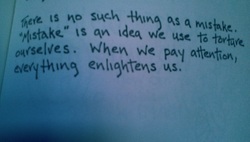 "There is no such thing as a mistake. 'Mistake' is an idea we use to torture ourselves. When we pay attention, everything enlightens us." --Cheri Huber, That Which You are Seeking is Causing You to Seek My student swings the hammer and misses the mark. "I'm sorry!" the words leap to lips and spill out, dismay clearly evident. No one is injured. The hammer simply didn't fall in the right place. "No worries!" I say, "This is part of the learning process!" And I smile. Then we talk about how the metal reacted to the errant swing. I point out that something that was a "mistake" in one situation ends up being a "technique" in another. We discuss and move on. This scene has played out not once or twice, but dozens of times. And the dismay on my student's face secretly breaks my heart. It breaks my heart partly because making mistakes is a crucial part of learning to do something the right way. Niels Bohr said "An expert is a person who has found out by his own painful experience all the mistakes that one can make in a very narrow field." It's not a snappy quotation, (and ohmygosh, implying only men can be experts!!) but look at him allude to "painful experience". Look at how he talks about "all the mistakes". Learning can be really hard, folks. My students want to learn, be successful, do amazing things, but there is a crushing fear of making mistakes. But each mistake can be a treasure trove of learning, if we pay attention. Errors are inevitable, but an experienced smith can identify errors early on, and fix them before they become problems. And how do you become an experienced smith? Well, you make all the mistakes there are to make. (And you watch others make mistakes and fix them. And you read about others making mistakes and fixing them. And you try different fixes to the same mistake. And on and on and on.) Mistakes and their fixes are THE MOST IMPORTANT PART of learning. I work extra special hard to create a safe space for students to learn and explore. I'm here to help, to answer questions, to provide options, encouragement, and moral support, but students get to make --and fix-- their own mistakes. And that means that they are empowered to do their own troubleshooting, which makes them a better smith down the road. When I was first learning how to smith, there were a lot of well-meaning folks who tried to help me avoid making mistakes. I lost track of the number of times that someone took my hammer out of my hand and "fixed it" for me. This happened most memorably in the middle of a speed forging competition. Because of this, I became very interested in what I could learn from my mistakes, and I think I'm a better smith because of it. |
AuthorBlacksmith, instructor, mischief-maker. Archives
December 2025
Categories
All
|
The legal stuff (disclaimer, privacy, terms, opt-out)
Frederick Location: 26 West All Saints Street, Frederick, MD 21701
Lititz Location: 130 Rodney Ln, Lititz, PA 17543
Frederick Location: 26 West All Saints Street, Frederick, MD 21701
Lititz Location: 130 Rodney Ln, Lititz, PA 17543

 RSS Feed
RSS Feed